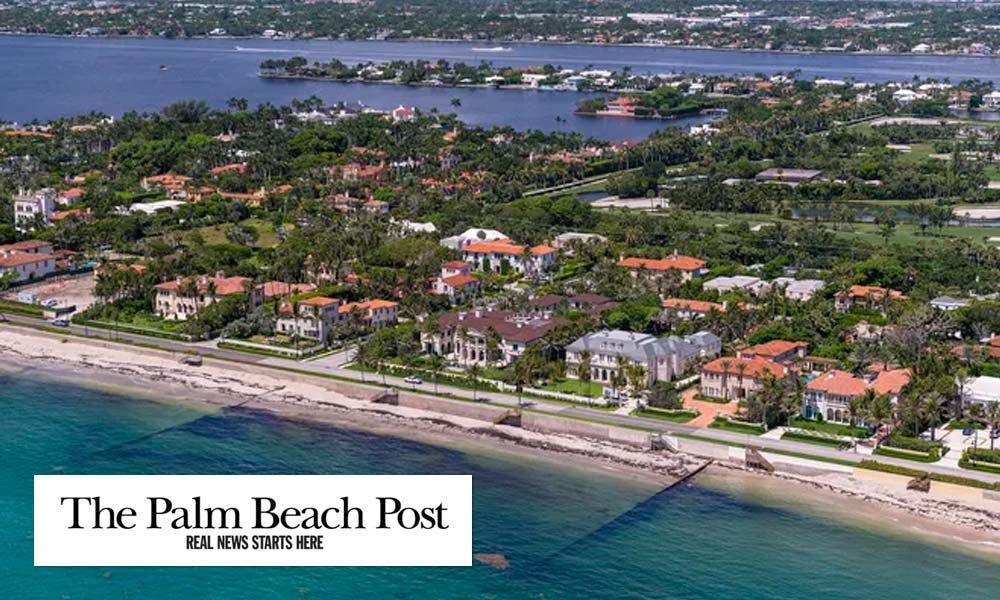By Susan Salisbury, Special to the Daily News
Palm Beach’s real estate market drives its economy, and the COVID-19 pandemic has pushed it into overdrive as buyers leave large cities for a lifestyle with more freedom, more security, and lower taxes, experts agree.
On Thursday, the Palm Beach Chamber of Commerce sought to give perspective on the issue by bringing together a panel of experts to discuss Real Estate: The Island’s Economic Driver during a Zoom meeting.
Katherine “K.T.” Catlin, an alternate member of the Architectural Commission and executive officer of the Gold Coast Builders Association, advised buyers to do their due diligence and to listen to their architect about what changes might be allowed to a house such as tearing it down or making additions.
Catlin recalled a North End property where a real estate agent had advised the buyer there would be no problem adding a second story.
However, she drove by the property and saw that it was non-conforming. Once a renovation has exceeded 50 percent of the home’s value, FEMA flood-plain regulations may come into play regarding the elevation of the house. That could complicate the project’s feasibility.
For a $6 million home, $654,000 goes to soft costs such as school impact fees, regulations, and permitting, Catlin said.
“Would you say that maybe we are over-regulated?” Catlin said. “While we are lucky because we have a buyer who can do a discretionary purchase, we also have to be responsible in the impact that can have.”
Jonathan Miller, co-founder of Miller Samuel Inc., a real estate appraisal and sales-analysis company in New York City, said the top reason people are migrating from the New York Metro area to Palm Beach is taxes. This includes changes to state and local tax deductions, known as the SALT deduction, that took effect with the 2018 tax year.
As taxes continue to rise in New York and other places, the influx to Palm Beach will continue, Miller predicted.
Technology that enables people to work from anywhere also is playing a role. Instead of having to drive an hour or more to work, people can live where they choose and go to the office once or twice a month.
“Who wouldn’t want to live in Palm Beach and fly to New York once a month?” Miller said. “It is sort of a no-brainer.”
Guy Rabideau, a principal attorney with partner David Klein at Rabideau Klein, a Palm Beach law firm, said the market has been frenetic with activity since May following what has been a busy few years.
“COVID has shown people they want to be out of the bigger cities,” Rabideau said. ”They can go out to restaurants here. We have a better living environment.”
On the downside, Rabideau said the press is “merciless” in its coverage of Florida and COVID-19. People in Florida have much more freedom from COVID-related regulations compared to New York and California, he said.
“There is nothing our governor can do right. The New York governor cannot do anything wrong. Our COVID rate is much less,” Rabideau said. “People still want to have a life.”
In addition, Palm Beach is valued as a safe place and did not have the political unrest seen in other places this year, he said.
“You can put the bridges up and stop anything from coming into town,” Rabideau said. “Some people were incredibly scared of what was going on in other places.”
Rabideau agreed that the tax benefits in Florida will continue to be a plus, but said the lack of privacy in public records discourages some from buying here. In some cases, such as Venezuelan buyers with kidnapping concerns, he has worked with the property appraiser’s office to keep clients’ names off its website.
Palm Beach Daily News real estate editor Darrell Hofheinz moderated the panel.
Hofheinz said the Shiny Sheet has been a leader in letting people know who is buying what.
“Our philosophy is that people deserve to know who their neighbors are,” Hofheinz said.

